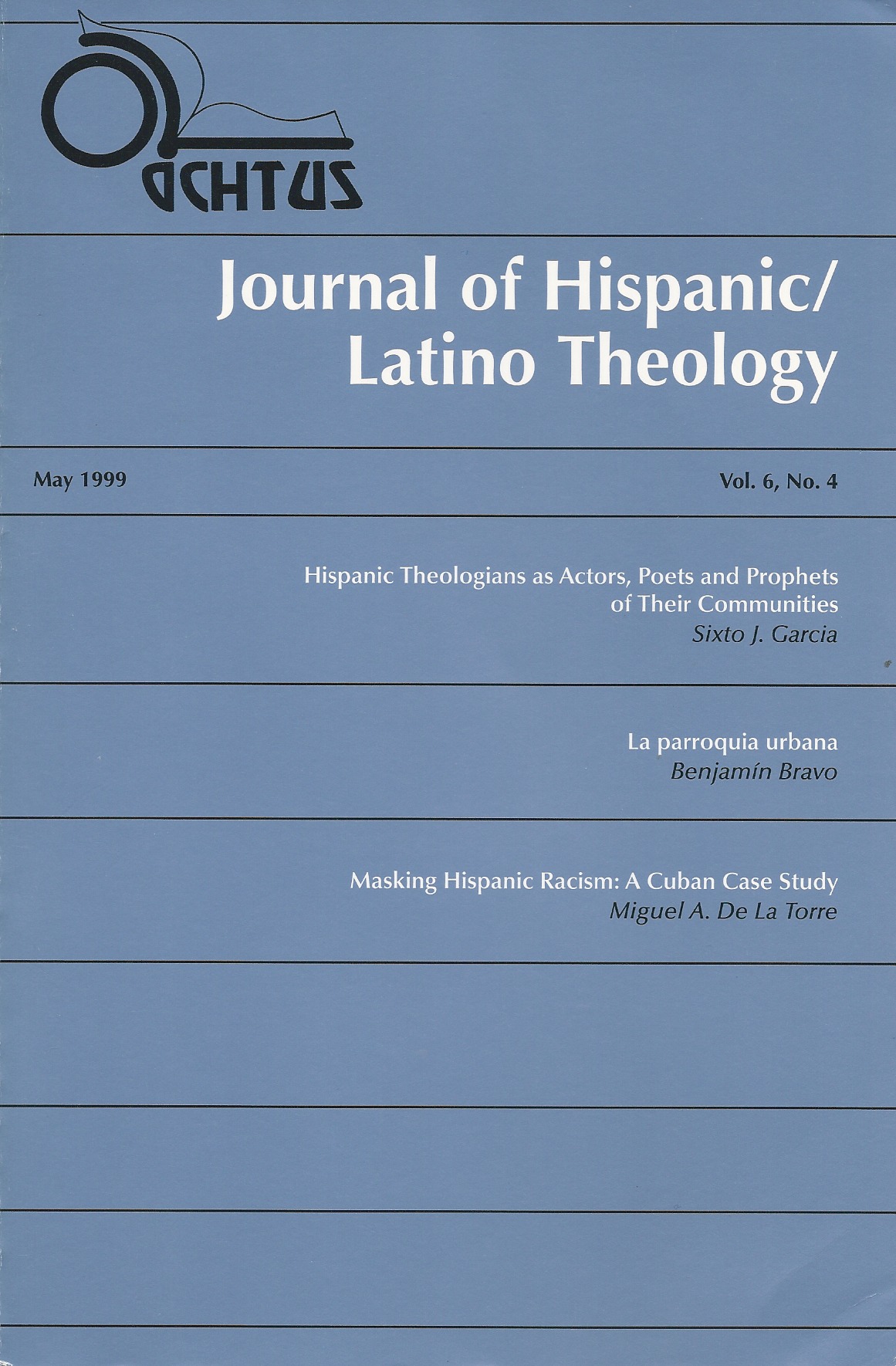Volume 6, Number 4 (1999)
Hispanic Theologians,
In and Out of Place
What is the distinctive character of the growing body of U.S. Hispanic theology? In his contribution to We Are a People! Initiatives in Hispanic American Theology (Minneapolis: Fortress, 1992), editor Roberto S. Goizueta asked, “As US. Hispanic theologians attempt to develop a theological reflection born out of the historical experience of our communities, we are confronted with the question, 'What are we doing when we ground our reflection in that experience?' ” (51) The title of Goizueta’s essay itself supplies the response: “Rediscovering Praxis: The Significance of U.S. Hispanic Experience for Theological Method,” where he concludes: "It is by being self-consciously faithful to the particularity of our own experience as U.S. Hispanics that we are faithful to the larger human community. Consequently, it is by being faithful to our identity as U.S. Hispanic theologians that we are faithful to the larger theological community” (77). Nurtured from the first by the insights of Latin American contextual theologies, U.S. Hispanic American theology continues to be enriched and challenged by insights that cross national and denominational borders.The essays in this issues of the Journal of Hispanic /Latino Theology testify to the ways in which our theologies continue to regard fidelity to the Gospel and to the experience of our communities in Latin America and in the U.S. as standards for the integrity of our theological efforts. In his programmatic essay, "Hispanic Theologians as Actors, Poets and Prophets of their Communities,” Sixto J. Garcia (Th.D., University of Notre Dame) writes that the very "legitimacy of Hispanic theology as a way of doing critical theological reflection” relies on the principle “that women and men who are the recipients of God’s revelation do not exist as abstract, non-historical, non-cultural beings, but rather as very concrete and identifiable historical and cultural beings.” Dr. Garcia is vice-president of ACHTUS and is professor of fundamental and systematic theology at St. Vincent de Paul Regional Seminary in Boynton Beach, Florida. It is especially encouraging to note that the lecture that gave rise to this paper was originally presented at Harvard Divinity School at the invitation of Nueva Generación, the HDS Latina/o student group that includes among its members a number of Hispanic Theological Initiative scholarship recipients and ACHTUS affiliate members.
In “La Parroquia Urbana,” Benjamín Bravo, a member of this journal’s board of contributing editors, presents rich reflections on the urban parish that are nourished by his own breadth of experience as a pastor and as a theological educator. Pastor of Immaculate Heart of Mary Church in Mexico City, he is also professor of pastoral theology at the Pontifical University of Mexico, professor of urban ministry and popular religion at the Franciscan Institute of Philosophy and Theology in Mexico City and coordinator of urban ministries of the Organización Eclesial Autónoma. Bravo’s contribution to this issue of the JHLT calls attention to ways in which pastors and theologians alike are addressing the concern most recently addressed in Pope John Paul II’s January 1999 Post-Synodal Apostolic Exhortation, Ecclesia in America: "The evangelization of urban culture is a formidable challenge for the Church. Just as she was able to evangelize rural culture for centuries, the Church is called in the same way today to undertake a methodical and far-reaching urban evangelization through catechesis, the liturgy and the very way in which her pastoral structures are organized” (Ecclesia in America 21).
In his contribution to this issue, “Masking Hispanic Racism: A Cuban Case Study,” Miguel A. de la Torre (Ph.D., Temple University) takes an unflinching look at an especially painful facet of Hispanic history and present experience. By calling attention to a topic that has thus far received very little consideration from US. Hispanic theologians, whether Catholic or Protestant, he reminds us that there is much more to Hispanic theology than the celebration of our history and our identity. In their 1979 Pastoral Letter on Racism, Brothers and Sisters to Us, the Roman Catholic bishops of the US. confronted the fact that, "Racism is a sin: a sin that divides the human family, blots out the image of God among specific members of that family.... It mocks the words of Jesus: ’Treat others the way you would have them treat you.’ Indeed, racism is more than a disregard for the words of Jesus; it is a denial of the truth of the dignity of each human being revealed by the mystery of the incarnation.” As Hispanic theologians who ground our theological reflection on the experiences of our communities, to turn away from the more difficult aspects of that experience, or to ignore the non-innocence of our past and of our present, would be negligent and irresponsible.
— Jean-Pierre Ruiz, St. John’s University, New York
Editorial
From the Editor
Jean-Pierre Ruiz
Articles
La Parroquia Urbana
Benjamín Bravo
Masking Hispanic Racism: A Cuban Case Study
Miguel A. De La Torre
Book Review
Book Review
Alberto L. García

Editors (vol. 6 no. 4)
- Editor
- Jean-Pierre Ruiz
- St. John's University, New York
- Associate Editor
- Alejandro García-Rivera
- Jesuit School of Theology at Berkeley

